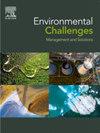Green HRM for sustainable aviation: An integration evaluation using PLS-SEM and fsQCA
Q2 Environmental Science
引用次数: 0
Abstract
This study examines the impact of Green Human Resource Management (GHRM) practices on Green Organizational Culture, Employee Green Behavior, and Carbon Emission Reduction in the aviation industry. Given the industry's significant environmental footprint, integrating sustainable HR practices is essential. Using a quantitative approach, data were collected through an online survey targeting employees involved in HR, sustainability, and operations. Participants were deliberately chosen using purposive sampling to ensure they possessed the necessary expertise. To test the hypothesized relationships and explore complex causal configurations, a hybrid methodological approach was adopted, combining Partial Least Squares Structural Equation Modeling for theory testing with Fuzzy-Set Qualitative Comparative Analysis to identify alternative pathways leading to carbon emission reduction outcomes. Findings reveal that Green Training & Development, Green Performance Management, and Green Organizational Culture significantly influence Employee Green Behavior and Carbon Emission Reduction. However, Green Compensation & Rewards does not directly impact Employee Green Behavior but has an indirect effect through mediation. These results align with previous research on GHRM and sustainability but highlight industry-specific challenges. Theoretical implications extend existing GHRM models by emphasizing mediation effects, while practical implications suggest targeted HR policies for sustainable aviation. Limitations include reliance on self-reported data and the study’s focus on a specific industry. Despite this, the research offers valuable insights into effective HR strategies for enhancing environmental performance in aviation.
可持续航空的绿色人力资源管理:使用PLS-SEM和fsQCA的集成评估
本研究探讨了绿色人力资源管理实践对航空企业绿色组织文化、员工绿色行为和碳减排的影响。考虑到该行业对环境的巨大影响,整合可持续的人力资源实践至关重要。采用定量方法,通过在线调查收集数据,目标是参与人力资源、可持续发展和运营的员工。参与者是故意选择使用有目的的抽样,以确保他们拥有必要的专业知识。为了验证假设关系和探索复杂的因果配置,采用混合方法,将偏最小二乘结构方程模型与模糊集定性比较分析相结合进行理论检验,以确定导致碳减排结果的替代途径。研究结果显示,绿色培训&;发展、绿色绩效管理和绿色组织文化对员工绿色行为和碳减排有显著影响。然而,绿色补偿&;奖励不直接影响员工绿色行为,但通过中介作用产生间接影响。这些结果与之前关于GHRM和可持续性的研究一致,但突出了行业特有的挑战。理论意义通过强调中介效应扩展了现有的GHRM模型,而实践意义则为可持续航空提供了有针对性的人力资源政策。局限性包括依赖于自我报告的数据,以及研究的重点是一个特定的行业。尽管如此,该研究为提高航空环境绩效的有效人力资源策略提供了有价值的见解。
本文章由计算机程序翻译,如有差异,请以英文原文为准。
求助全文
约1分钟内获得全文
求助全文
来源期刊

Environmental Challenges
Environmental Science-Environmental Engineering
CiteScore
8.00
自引率
0.00%
发文量
249
审稿时长
8 weeks
 求助内容:
求助内容: 应助结果提醒方式:
应助结果提醒方式:


